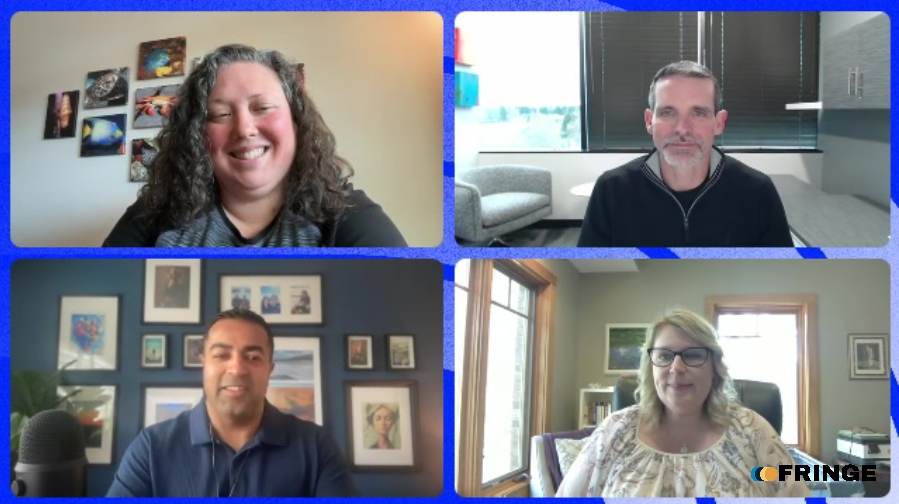Start Small, Think Big - A Roadmap for Law Firm Change that Actually Sticks

In this insightful episode of Fringe Legal, host Abhijat Saraswat has an in-depth discussion with India Preston, Director of Platform Solutions at legal tech startup Lupl. They delve into India's winding journey into legal project management, tactical approaches to driving adoption, and how to effectively challenge established processes.
India shares learnings and advice drawn from her diverse experiences - from helping build out Linklaters' LPM function from the ground up to make the leap to an early-stage legal tech startup. She provides a rare longitudinal view of how legal project management has evolved from a nascent concept to a widely recognized discipline today.
Key Takeaways
- While LPM has gone from barely existing in the early 2000s to being commonly known today, there is still substantial room for education on how to apply it effectively. LPM principles empower lawyers to run matters like projects, but specialized LPM roles create significant value on complex matters.
- Project management qualifications alone don't cut it for legal project managers to be successful. "Soft skills" to integrate smoothly with lawyers and legal teams are just as important, if not more so.
- Identifying concrete problems that need solving is absolutely crucial before adopting any new solution or technology. Without an anchor in specific pain points, adoption will struggle no matter how exciting the new solution seems at first glance.
- Rollouts of new technology or processes should start small and be targeted before expanding more widely across a firm. The tendency may be to go big with a splashy firmwide launch, but this rarely succeeds.
- Resources like use case guides, template libraries, and informal user communities help drive adoption by making the novel feel familiar. However, these need to be grounded in solving real firm problems.
- Process mapping workshops - with the help of an unbiased external facilitator - can challenge status quo thinking and processes in extremely constructive ways. Just asking "why" repeatedly can unearth entrenched inefficiencies.

Actionable Takeaway: Start Small Before Going Wide
One of the actionable takeaways from the discussion was about rolling out new technology/processes at a law firm. India advocates starting small before gradually expanding rather than trying to conquer the whole firm at once.
Some ways to put this into practice:
- Run an initial pilot with a sympathetic team vs. imposing something firmwide from day one. Prove success on a small scale first.
- Limit templates and customizations to the most important one or two use cases rather than overwhelming with everything possible upfront. Get the foundations right.
- Identify 2-3 friendly partners who are willing to trial and endorse the change to their peers. Create pull rather than just push.
- Only expand gradually as you iron out creases and have concrete quick wins to showcase. Let early adopters serve as organic salespeople.
The natural tendency may be to go big with a splashy firmwide launch that creates a visible impact. But India explains lawyers are inherently change-averse yet competitive. They'll be much more compelled to adopt something new if trusted peers are already using it successfully.
Starting small allows you to nimbly build the foundations for effective wider rollout down the line. Once you have a few advocates with positive experiences, expansion becomes much easier. Don't underestimate the power of small wins.
Other Key Highlights:
"Back in 2013, LPM was barely even a whisper in the legal industry."
India provides helpful context on just how nascent legal project management was when she first stumbled into the field back in 2013. LPM principles have always been embedded in lawyers' work to some degree, but formalized LPM was effectively non-existent at the time.
This makes India one of the pioneers of legal project management, helping develop it from the ground up. For those considering a career pivot into legal ops, her story shows how rewarding it can be to build something new.
"I think as a lot of those changes and all of the competitors that are starting to surround lawyers and law firms come more into play, legal project management is going to become necessary on every matter."
With the increased importance of leveraging legal tech, alternative service providers, and innovation across the industry, India predicts LPM will become ubiquitous in the near future. It will evolve from being a "nice to have" on large matters to being a necessity on virtually every engagement.
For law firm leaders, this is a call to action. Being deliberate about scaling up LPM capabilities will soon become a competitive advantage versus peers. Firms that cling to old ways of working will find themselves losing out.
"If you don't have a problem, you don't know what you're trying to solve. So even if you come across a really nice new shiny product that looks great. If you don't have a problem that that product is designed to solve, then you're not really going to see any real adoption."
As simple as this sounds, India emphasizes identifying concrete problems is supremely important before adopting any new technology, process, or solution. Without anchoring in actual pain points, adoption will always struggle.
Too often, new tools are purchased simply because they sound exciting or innovative. But they end up gathering dust due to a lack of use cases - have clear objectives first.
"You can't go into a new piece of technology and without understanding any way that it's going to apply to any of your matter types."
India explains why use case guides, examples, and tutorials are so vital for user adoption of new legal technology. Without seeing practical applications tailored to their work, lawyers will be lost.
Providing this sort of onboarding and continuous education gives people the confidence to integrate new tech into day-to-day workflows successfully. Don't leave them to figure everything out themselves from scratch.
"When you stand back from a process that you've just mapped in a kind of as is, this is how they do it. You don't ask any questions. You put up on the wall, on post-it notes exactly the process as it is, and then you stand back and you say, why do you do that? Why do you do that? Why do you do that? You just play the idiot."
India highlights how process mapping workshops, especially with an unbiased external facilitator, can be extremely effective at challenging status quo processes and surfacing entrenched inefficiencies.
Simply asking "why" repeatedly removes assumptions baked into workflows that have become institutionalized over the years without clear logic. Reconstruction of the workflow often becomes an obvious improvement.
This is a powerful way to kickstart innovation. Too few lawyers have time for introspection on how to enhance their working practices. An external nudge can yield real improvements.

Further Exploration:
Some questions that came to mind after we stopped recording:
- How might you advocate for and educate senior lawyers at your firm about the value of LPM when skepticism exists? What data, use cases, and external benchmarks could help make the case?
- If you were rolling out a new technology at your firm, what initial quick wins could you target before expanding more widely? How might you identify and recruit early adopters?
- What are examples of legal processes at your firm that would benefit most from being process mapped and reconstructed? How could you secure engagement from time-pressed partners?






Become a Fringe Legal member
Sign in or become a Fringe Legal member to read and leave comments.
Just enter your email below to get a log in link.